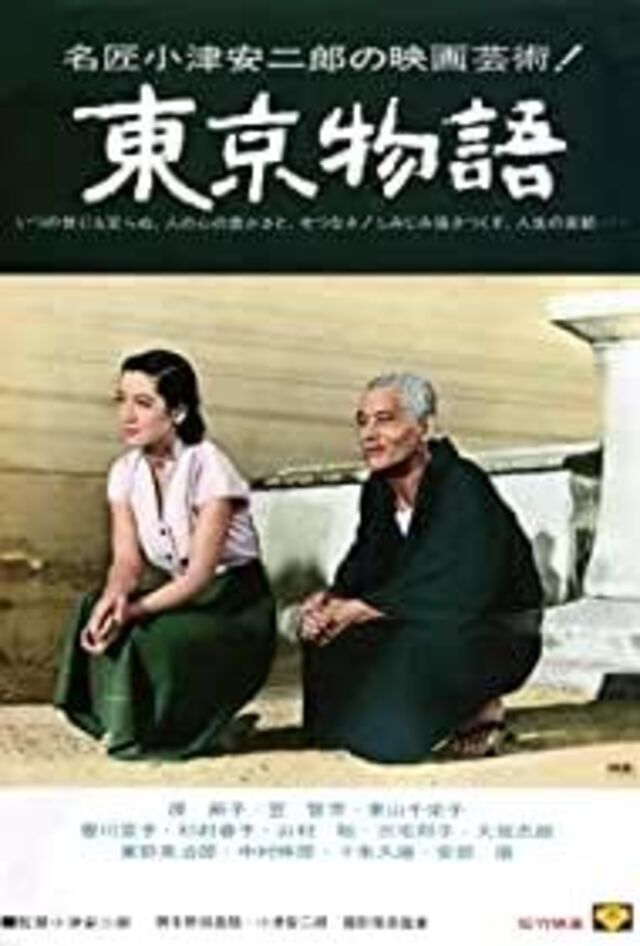Gross worldwide
$40,468

Gross worldwide
$40,468
Movie reviews
( 104 )
Add reviews
By Sarai 2022-07-25 16:09:38
Tokyo Story--Quiet Tokyo and Quiet Movies
Quiet, quiet, quiet and
insipid, filling the whole house.
The sound of the train seems to be heading to everyone's heart.
By Zack 2022-04-24 07:01:14
Thinking of "Joy and Mourning" I watched a year ago, Ozu was more than 60 years earlier than it, and he thought more deeply. The two elderly people's trip to Tokyo ended in constant thanks and apologies. In the eyes of their children, they were friends from the countryside, maybe not as good as friends. In the meantime, the happiest thing for the old man is not staying upstairs all day, not sleeping all night at the hot spring hotel by the lively poker game and music, not going to the...
By Daniela 2022-04-24 07:01:14
Beneath the dullness is the surging of great power
"Tokyo Story" is a story constructed under the Japanese cultural system. The film explicitly or implicitly reflects Japanese cultural elements such as cumbersome etiquette, hierarchy, and shame culture. In addition, the film is old, and it is easy for the public to miss it. A classic, and in fact, the film's enormous charm is enough to cross these cultural barriers.
By Ali 2022-04-24 07:01:14
The 1953 black and white film, re-watching the old film, has a lot of new experience.
A bland story, but deep enough to suffocate. Slow rhythm, clean shots, concise dialogue, still life freeze, the beauty of light and shadow in black and white films, delicate and lonely.
Japanese films after World War II are full of gloomy emotions, and the last embodiment of traditional Japanese virtues is actually the daughter-in-law of the deceased son of an old man. The...
By Derrick 2022-04-23 07:02:32
Facing the quiet black and white film, I feel very heartache.
It's the Japanese's unique subtlety. Every picture seems peaceful and quiet. The dialogue is tacit, calm, and reveals a beautiful meaning, but this silence is terrifying.
For the first time, I felt that there was a cold temperament in the etiquette of the Japanese nation. Everyone respects their parents, their partners, their children, and the rest of the society, bowing and nodding, serving tea and water, and every word of...
User comments
( 85 )
Add comments
By Amelia 2023-09-06 16:57:11
2021.05.14 @ Archives I don't know how many brushes. It is impossible to pick out the fault, and Hou Hsiao-hsien really stole a lot of teachers. The scene scheduling is invincible, and I don't care about subtitles. Last time I watched it, I only felt that there was no nonsense. This time I felt that there was no unreasonable scene (and never rely on close-up), and it was often beyond expectations and reasonable. After the funeral dinner, the father takes a backseat, a completely unbalanced compo
By Gerard 2023-09-02 23:02:49
Only a lonely daughter-in-law can understand a lonely old couple. "Children may not love their parents. They believe that they are in love, but in the scouring of daily life, that feeling has gradually disappeared, and love and respect are only a self-righteous...
By Rubye 2023-08-26 14:51:35
After seeing it, I can feel that it is still better than the Tokyo family...much better. Naturally, there is no need to say the language of the camera. The key is to successfully depict the subtle embarrassment and loss between parents and children. I feel so empathetic... From late spring to Monogatari, Hara Setsuko still laughed to the extreme and turned into sadness; that The inescapable loneliness and the disappointment of separation are best kept on the shelf on weekdays. Once you think...
By Zack 2023-06-28 19:45:14
Whether it is the train on the track, the children on the street, the ship by the port, or the family of the Hirayama family, they are all trains that keep walking. Maybe the scenery along the road is beautiful, but even if we stop, we have no time to watch it, because when we stop, life is already urging us to move forward. Yasujiro Ozu's whole film calmly and calmly reveals the sadness of life - the fragmentation and endless pain beneath the ordinary. But as Romain Rolland said: There is only...
By Caitlyn 2023-06-28 13:28:48
Art knows no borders, little pink is...
Shukichi Hirayama: But if I had known things would come to this, I'd have been kinder to her while she was alive.
Kurazo Kaneko: We can't leave them there all night.
Shige Kaneko: It can't be helped, can it?
Kurazo Kaneko: Let's have Kiyo come down and we'll put them upstairs.
Shige Kaneko: They're too drunk to make it.
Kurazo Kaneko: What will we do, then?
[Shige scoffs]
Shige Kaneko: What a mess.
[She gets to her feet]
Shige Kaneko: You sleep upstairs. I'll put them here.
[She starts laying out bedrolls]
Shige Kaneko: What a bother. Why didn't he tell me he was coming back? So late and so drunk! I hate drunkards. With a stranger, too. Oh, this is disturbing.
Tomi Hirayama: What a treat to sleep in my dead son's bed.